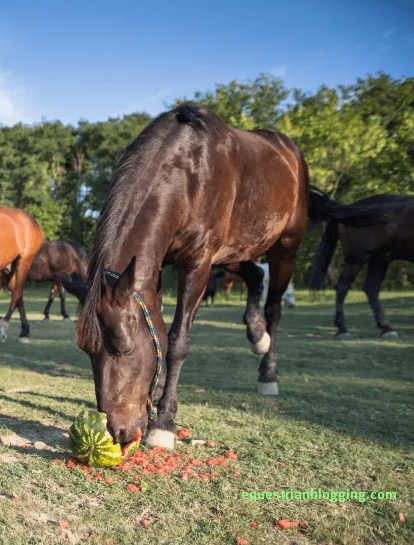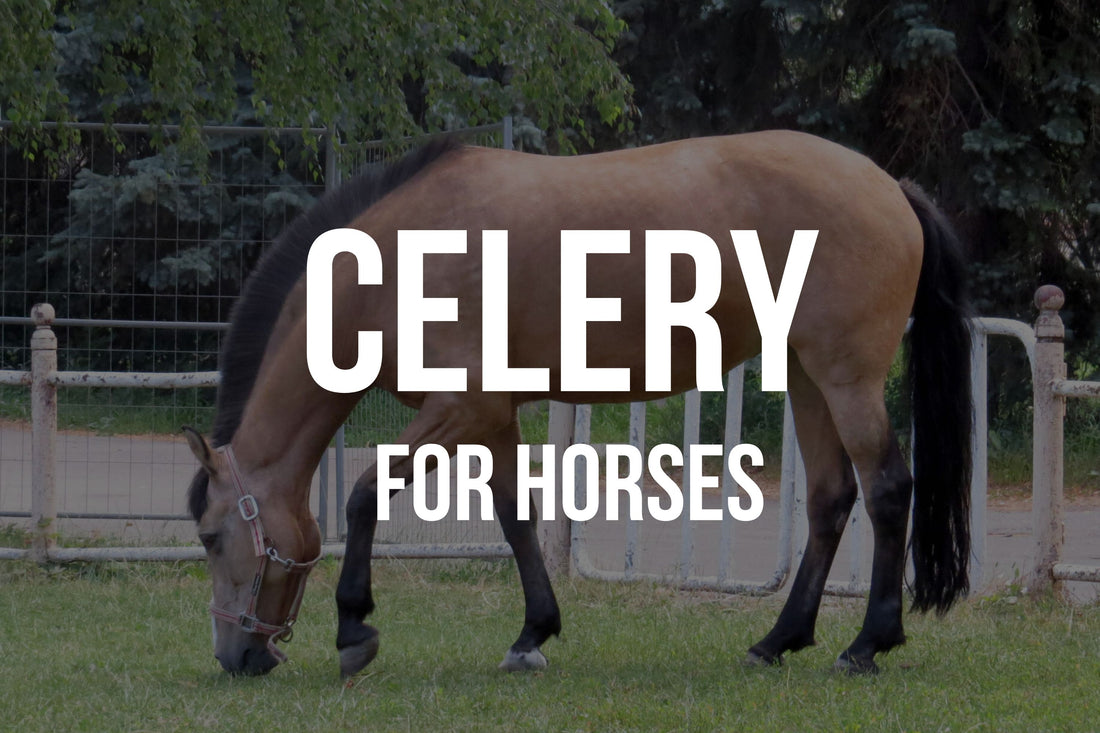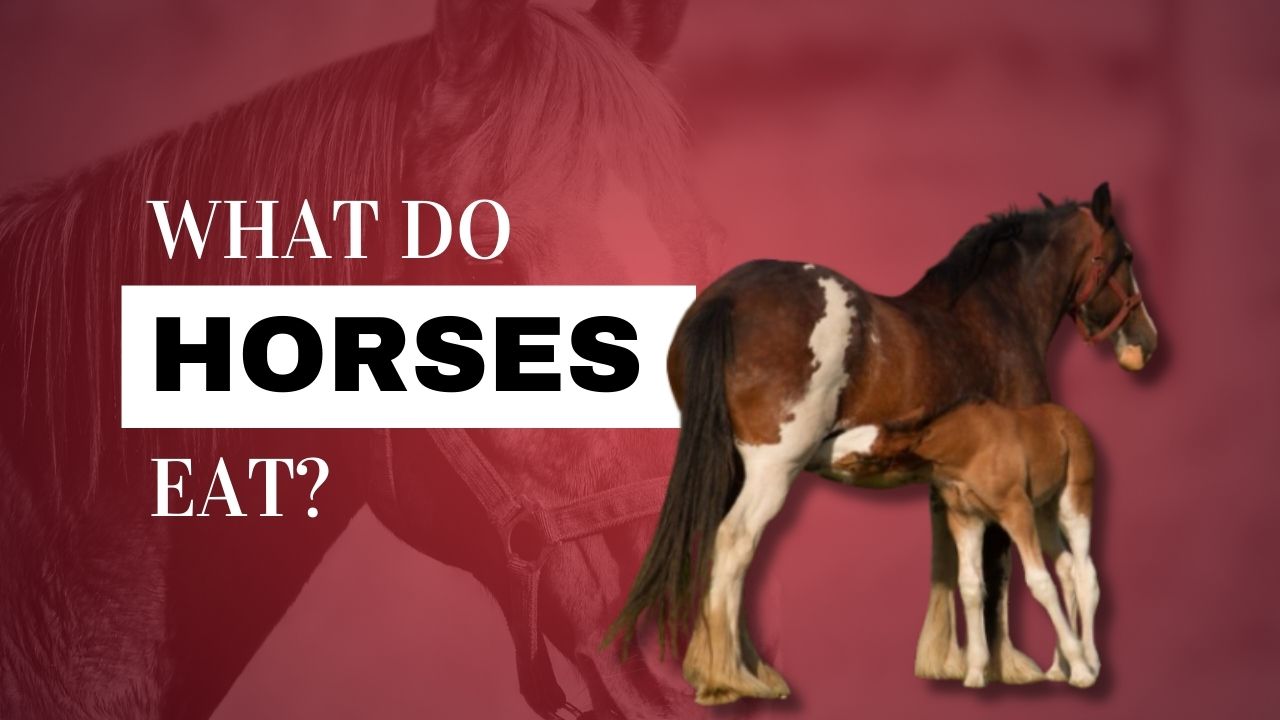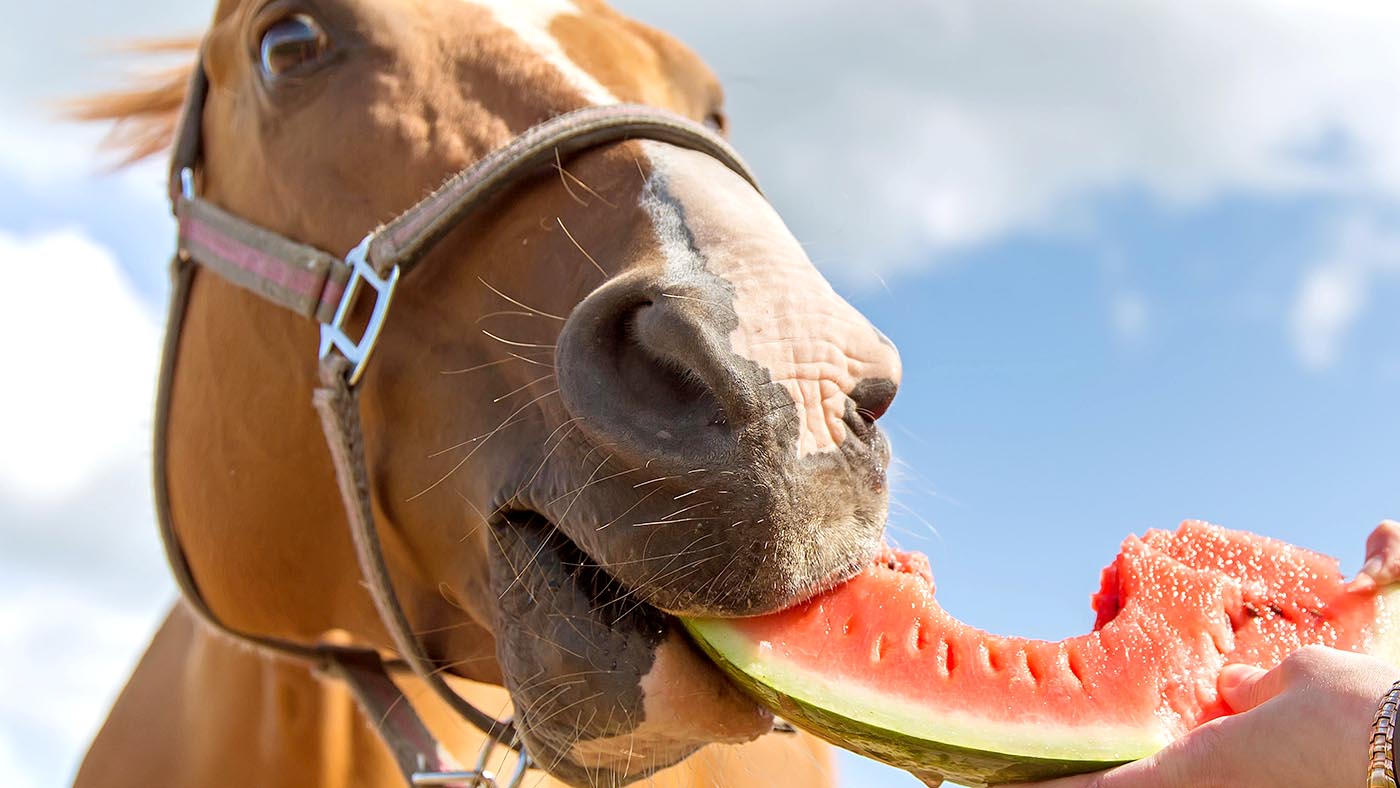Horses can eat watermelon rinds in small quantities. Watermelon rind is fine for horses to consume, but should be cut into small, easy-to-chew pieces to avoid choking hazards.
Your horse can also eat the ripe part of the watermelon, including the seeds.

Exploring Watermelon Rinds For Horses
Watermelon rinds can be a refreshing treat for horses, offering hydration and a crunchy snack. When cut into small, easy-to-chew pieces, horses can enjoy the rind safely as an occasional treat, alongside the ripe flesh and seeds of the watermelon.
This unique treat can be a delightful addition to your horse’s diet.
Horse Owners’ Guide
As a responsible horse owner, you want to provide your equine companion with a well-balanced diet that includes healthy and tasty treats. While horses typically enjoy munching on fresh fruits and vegetables, you might be wondering if watermelon rinds are safe for them to consume. In this guide, we’ll explore the topic of feeding watermelon rinds to horses, including the nutritional benefits, precautions to consider, and horse preference and feeding tips.
Why Watermelon Rinds?
Watermelon rinds are the tough outer layer of the fruit that is often discarded. Surprisingly, horses can actually enjoy these rinds as a tasty and refreshing treat. While horses may prefer the sweet flesh of the watermelon, the rind can provide them with some additional nutrients and hydration.
Nutritional Benefits
When it comes to the nutritional value, watermelon rinds offer a variety of benefits for horses. They contain essential vitamins such as vitamin A and C, as well as minerals like potassium and magnesium. Additionally, the rinds are high in fiber, which can aid in digestion and promote a healthy gut. By incorporating watermelon rinds into your horse’s diet, you can contribute to their overall well-being.
Precautions To Consider
While watermelon rinds can be a healthy treat for horses, there are a few precautions to keep in mind. It’s important to cut the rinds into small, easy-to-chew pieces to reduce the risk of choking. Additionally, make sure the rinds are fresh and free from any pesticides or harmful chemicals. Always wash the rinds thoroughly before feeding them to your horse to ensure their safety.
Horse Preference And Feeding Tips
Every horse has its own preferences when it comes to treats, so it’s essential to observe your horse’s reaction to watermelon rinds. Some horses may devour the rinds eagerly, while others may show less interest. Start by offering a small piece and monitor their response before introducing larger quantities. Remember to feed the rinds in moderation as part of a balanced diet.
In conclusion, watermelon rinds can be a healthy and enjoyable treat for horses. Not only do they provide additional nutrients, but they also offer a refreshing snack during hot summer days. Just remember to take precautions, monitor your horse’s preference, and incorporate the rinds in moderation. By doing so, you can enhance their diet and provide them with a delicious and nutritious treat.

Can Horses Safely Consume Watermelon Rinds?
Watermelon rinds are safe for horses to consume in small quantities. However, it is important to cut the rinds into small, easy-to-chew pieces to prevent choking. Horses generally prefer the sweet flesh of the watermelon over the rind.
Comparing Horses And Other Animals
Horses, known to enjoy the sweet indulgence of watermelon flesh, may also have a taste for the rinds. Let’s explore how different animals react to this summer favorite.
Dogs And Watermelon Rinds
Dogs, whose digestive systems struggle with thicker rinds, should avoid watermelon skin. The tough texture can lead to gastrointestinal issues like bloating and diarrhea.
Chickens And Watermelon Rinds
Chickens, on the other hand, happily peck away at the entire watermelon, rind included. While lower in nutrients, the rind offers vitamins B and C.
Insights On Feeding Practices
- Consider the animal’s digestive capabilities when offering watermelon rinds.
- Always cut rinds into small, manageable pieces to prevent choking hazards.
- Observe your pet’s reactions to ensure they tolerate and enjoy this treat.

Handling Watermelon Rinds With Caution
When it comes to feeding watermelon to your horse, it’s important to handle watermelon rinds with caution. While horses can enjoy the sweet, juicy flesh of watermelon, the rind requires careful preparation and monitoring during consumption to ensure your horse’s safety. In this guide, we’ll discuss the best practices for cutting and serving watermelon rinds to horses, monitoring their consumption, and recognizing signs of overindulgence.
Cutting And Serving
When serving watermelon rinds to horses, it’s crucial to cut them into small, easy-to-chew pieces. Large pieces of rind can pose a choking hazard to horses, potentially leading to serious health concerns. You can remove the green outer skin and cut the rind into manageable chunks. It’s advisable to serve watermelon rinds in moderation, as an occasional treat rather than a regular part of the horse’s diet. Remember to remove any seeds to prevent potential digestive issues.
Monitoring Consumption
Keep a close watch on your horse’s consumption of watermelon rinds. If you notice any signs of discomfort, difficulty chewing, or unusual behavior after eating the rind, you should discontinue offering it as a treat. Additionally, be mindful of the quantity of rind provided to avoid excessive intake, which could lead to digestive upset or other health issues. As with any new food introduced to your horse’s diet, observe their reaction and adjust the portion size as needed.
Signs Of Overindulgence
Signs of overindulgence in watermelon rinds may include bloating, diarrhea, or vomiting. If you observe any of these symptoms, it’s essential to consult with a veterinarian to ensure your horse’s well-being. Regularly monitoring your horse’s overall health and responses to different foods can help in identifying and addressing any potential issues promptly.
Addressing Common Queries About Watermelon Rinds
Variety In Animal Preferences
Animals have different preferences when it comes to treats, and horses are no different. Some horses may enjoy munching on watermelon rinds, while others may not show much interest. It’s essential to monitor your horse’s reaction when introducing new treats like watermelon rinds.
Potential Alternatives
While some horses may enjoy watermelon rinds, others may prefer different fruits or vegetables. Before offering watermelon rinds as a treat, consider experimenting with other options such as apples, carrots, or even small amounts of oats to see what your horse enjoys the most.
Tips For Balanced Treats
When providing treats for your horse, moderation is key. While watermelon rinds can be a refreshing snack, they should not replace a balanced diet. Ensure that the majority of your horse’s diet consists of hay, grass, and specialized feed, and use treats like watermelon rinds sparingly as an occasional indulgence.
This HTML content addresses the common queries about watermelon rinds, providing information in a clear and concise manner. It includes relevant H3 headings that adhere to HTML syntax, ensuring the content is SEO-optimized and valuable for the readers. Each point is presented in short, easy-to-understand sentences, suitable for a broad audience.

Frequently Asked Questions Of Can Horses Eat Watermelon Rinds
What Does Watermelon Do For Horses?
Watermelon is a great treat for horses as they can eat the ripe part, including the seeds. In small quantities, watermelon rind is also fine to feed them. Just make sure to cut the rind into small, easy-to-chew pieces to avoid choking.
Horses may enjoy the flavor of watermelon, but preferences may vary.
Is There Any Fruit That Horses Can’t Eat?
Horses should avoid fruits with pits or stones, like apricots, cherries, and dates to prevent choking hazards.
Are Watermelon Rinds Toxic To Animals?
Yes, watermelon rinds are safe for animals to eat, including horses. They can consume the rind in small quantities without any toxic effects.
Can Farm Animals Eat Watermelon Rind?
Yes, farm animals like chickens and horses can eat watermelon rind in small quantities. It is safe and contains some nutrients.
Conclusion
Watermelon rinds can be a safe treat for horses if given in small quantities. While some may enjoy it, others may not. Remember to cut it into manageable pieces to prevent choking. In moderation, watermelon rinds can be a refreshing and healthy snack for your equine companion.

